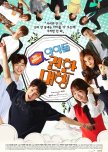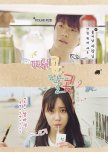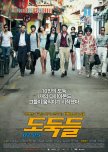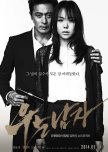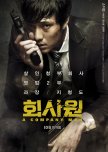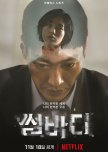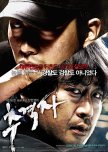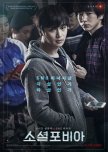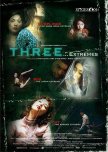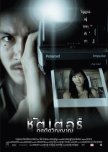
A frog (or frogs) dies from a stone thrown inadvertently
The Frog refers to an old Korean saying, “A frog dies from a stone thrown inadvertently”, which means people’s actions can have unintended negative consequences for others.“The Frog” is a pulse-pounding mystery thriller that seamlessly blends psychological tension with a high-octane narrative, making it a standout in the genre. Set across two distinct timelines, the series intricately weaves the fates of two men—Jeon Young-ha and Koo Sang-jun—whose lives are irrevocably altered by the presence of mysterious strangers and tragic events.
Young-ha, a reserved pension owner deep in the forest, finds his quiet life shattered when the enigmatic Yoo Seong-ha checks into his property. What begins as an innocuous visit quickly spirals into a nightmare as Seong-ha’s obsession with the pension pulls Young-ha into a game of manipulation, fear, and survival. Her presence is not just a disruption; it’s a catalyst for a series of increasingly disturbing events that push Young-ha to the brink.
In parallel, the series revisits the summer of 2000, where Sang-jun, a well-meaning motel owner, faces a different kind of horror. During the IMF crisis, a single act of kindness—offering a room to a stranded stranger—leads to an unthinkable tragedy that destroys his family and his livelihood. The show explores the psychological unraveling of Sang-jun as he grapples with guilt, public scorn, and the slow disintegration of his once-happy life.
Chief Yoon Bo-min, a tenacious detective who connects both timelines, adds another layer of tension as she digs into the mysterious happenings, driven by an intuitive sense of something deeply wrong. Her pursuit of the truth brings her dangerously close to the chaos surrounding both men.
The narrative is tightly wound, with each episode ramping up the stakes. The show is visually stunning, with beautiful mise-en-scenes that contrast the serene settings against the underlying dread.
One negative thing I found was that the transitions between the two timelines were not very seamless and can be confusing at first.
The terror comes from within—how far ordinary people can be pushed before they break.
In essence, “The Frog” is a suffocating, high-stakes drama that examines the devastating consequences of guilt, obsession, and the human capacity for both resilience and destruction. It’s a ride that leaves you breathless, with each episode escalating in intensity until the explosive conclusion.”
Cet avis était-il utile?
Cette critique peut contenir des spoilers
If you fall asleep while watching the drama, and no eyes are opened to see it, is the drama good?
We get it, Na Hong Jin's The Wailing (2016) is great! But that does not mean replicating its structure will yield the same results. Similar to that of the infamous double ritual scene in The Wailing, The Frog films two events occuring in separate timelines simultaneously, and uses editing to try to trick viewers from interpreting what is happening in the story. It is only until much later into the episode where the disjointed timeline is revealed and attentive viewers begin to get an idea of what had happened. However, unlike The Wailing whose tricky editing served a thematic purpose, The Frog presents no reasoning for its editing choice except to test the viewer's patience. Also coincidentally, both productions happen to tackle the problem of random evil. But the stark contrast of how the subject matter was handled between the two is clear once again. While The Wailing ventures on an ambitious aim of understanding the why, utilizing the director's personal wrestlings of his faith as a keystone for shaping the plot, The Frog gives a muted showcasing of the damages done by evil without much reflection except to maybe criticize a lack of empathy for strangers. The execution between the two is akin to a gymnast gracefully landing a complex somersault and a frog leaping and falling flat on its belly. The Frog's performance is not the prettiest nor very thoughtful, but at least there was an attempt.The series traces the timelines of two different lodging owners, Sang Jun, a motel owner, and Young Ha, a guest house owner. Both are victims of collateral damage by problematic renters, Hyang Cheol, a serial killer, and Seong Ah, a murderous squatter. Their narratives unfold nonlinearly, twenty years apart. In Sang Jun's case, a serial killer dismembers a body, for unknown reasons, in one of the rooms with a lake side view, which drives away business once the incident garners media attention. After a year, the motel owner goes bankrupt and is left with a broken family. Twenty years later in another remote corner of the same town, Young Ha deduces a woman has killed her stepson in the guest house. But to preserve the sanctity of his wife's final resting place and to avoid trouble involving a stranger, the pension house owner buries the truth. A year later, the same woman returns and tries to purchase the house.
Swarms of flashing lights and camera lens fill the air as media teams bombard a motel. We are at Lake Side View motel where Sang Jun frantically arrives to the scene oblivious of what has happened. A detective at the scene briefs him that one of his tenants is serial killer Ji Hyang Cheol, and the killer had dismembered a woman in one of the rooms. The devestated and terrified owner makes his way to the second floor room and uncovers the grisly truth. As if the traumatic event wasn't enough, Sang Jun soon realizes the greatest threat of Lake Side View motel that day wasn't the serial killer who was swiftly captured by police, but the hounding news anchors and reporters that covered the story without consideration for his circumstances.
For casual viewers, the scene of a media storm is not unordinary, but those who kept up with Korean entertainment news can link the event with the suicide of Lee Sun Kyun, a popular actor known for his unique voice. The coverage of his scandal was widespread and nonstop. Naturally, the climate was ripe for various rumors and unsupported allegations to spread among laypeople and professionals alike. It was only after his death when many people began to find the police, which leaked information, and the media, which relied less on the quality of the information but the quantity and quickness of their coverage, culpable. So, it should not color anyone surprised that a Netflix series attempts to capitalize on an infamous tragedy to function as a social commentary in the most careless and caricature-like manner, not even a year after his passing.
There is another frantic owner. But Young Ha has a good idea of what transpired inside the guest house and has the opportunity to correct an evil. He chooses not to. Instead, the bloodied crime scene with a corpse of a child is washed by his sweat, as the pension house owner ensures if Seong Ah, who casually cleaned the room in a hurry, left any lingering evidence, then he'll be the one to thoroughly erase it. Yet, similar to the reporters who had forgetten about and ignored Sang Jun's circumstances when covering his story, the writer ironically also forgets about Young Ha's situation while rushing to the next part of the story.
The Frog lazily puts both business owners, Young Ha and Sang Jun, adjacently together and parallel their misfortunes as one of the same. Yet, with a moment of reflection, it should be clear the pension owner's justification for not reporting the crime becomes flimsy when we consider:
I. Young Ha, whose daughter and son-in-law are willing to set up the house as a vacation house instead, is wealthy; Sang Jun invested his last cent into buying the motel and was penniless.
II. Seong Ah takes the corpse with her and cleans the crime scene; Hyang Cheol did not and left the dismembered body parts on the motel bedroom.
Any notions of an intrusive media or crime scene investigation team that affected the motel owner and his motel would not apply to the pension house. If Young Ha immediately reported the incident, most of the manpower would have been spent chasing Seong Ah down. A few forensics people may double check the guest house to see if there are any lingering evidence left, but they will not flip the whole place upside down as they did for the motel. In the absolute worst case scenario where information is leaked to the media, Young Ha can simply turn his pension house into a vacation home. Then, maybe the justitication for Young Ha's noninterference really boils down to a selfish businessman who did not want to involve his hands in the "meager death" of a stranger's child after all.
In a distant morning, Young Ha prepares the guest house rooms and the dinner ingredients for a scheduled family gathering. Out of the blue, Seong Ah returns in such a perfectly cliché fashion that calling it "cliché" wouldn't do it justice. After all, what kind of series sets up an entire episode for a cliché? The Frog did. Instead of creating a normal person who either keeps incriminating evidence for safe measure or discards them entirely to avoid trouble for possessing something he shouldn't, the brilliant writer opts for Young Ha to keep half-incriminating evidence. That is, he keeps the dashcam footage history, which means he'll be jeopardizing his life by holding onto the evidence, but he cleans the bloodied record, which was the other half of the evidence necessary to bring about reasonable suspicion. However, the nonsensical decision-making was perfectly orchestrated as it is crucial in enabling Young Ha to be stuck with Seong Ah. This is because if Young Ha possessed both pieces of evidence, a quick sucker punch to Seong Ah's face upon her unwelcomed appearance, would be the impetus to stun, restrain, and call the cops on her. In his current state, the pension house owner cannot do that because the recording, by itself, is insufficient evidence. Instead, he and Seong Ah must now apparently live together.
But, the whole purpose for a half-incriminating evidence, rather than no evidence at all, is to prepare ANOTHER cliché that occurs when our soft-hearted, child-murder witness has change of heart. Similar to married couples past their honeymoon phase, Young Ha cannot fathom living beside his newly acquired neighbor, which probably has something to do with her stuffing a dismembered child into a suitcase. However, Young Ha currently only has half the evidence for reasonable suspicion since he discarded the other half, so how can he compile enough evidence that goes beyond a reasonable doubt? A voice recorder will do! Now after he records Seong Ah's confession, he can simply drive off into the sunset as he presents the police his undeniable evidence. Nope. In predictable fashion, not only does the psycho woman conveniently spot the recorder box, she finds Young Ha right as he pulls up to the police station, floors the gas pedal and T-bone collides the poor man's car in broad daylight for every eyewitness to see. Is this disappointing or actually impressive stuff? We're talking linking clichés due to a single action the character made. Talk about making the most of something, even if none of the characters make sensible decisions.
That question is quickly put to rest in the following scene. We see a bloodied Young Ha in a wrecked car and Seong Ha with a mean glare casually approaching him. His car is bellowing with smoke while he is losing consciousness. Cops are running over to rescue the owner. Everyone saw what had happened. So, all the cops need to do is place Seong Ah under arrest for attempted murder, or at least, reckless endangerment, right? Just as viewers eagerly await for Justice to be served on an ice-cold platter, the writer jumps out of the screen and whispers into our ears, "Did anyone ACTUALLY see what happened?" And just like that, the attempted murder becomes nothing but wistful, evaporating memories. When viewers awake from their hypnotic slumber, like Kevin Spacey in The Usual Suspects, we are convinced the accident never existed. Young Ha and Seong Ah also go back to being neighborly housemates. Then, some time later, a douchebag cop loverboy appears. He dies. Once again, no one gives a hoot about his going missing until his body is found after the entire ordeal is over. I guess people's lack of consideration for his disappearance is once again chalked up to "he was on vacation."
Finally, the two timelines converge into one, but the timelines are not the only thing that changes. There is an abrupt and drastic tonal shift where the series morphs into some Jason Bourne meets Terminator action flick, losing all the artificial tension that the first half laboriously spent attempting to build up. Instead, that tension is quickly replaced with more clichés, logical gaps, and half-assed writing:
A man carries a rifle into a hosptial filled with people, shoots another man, leaps out of the window of the several story building suffering from minor injury, and limps away. Authority figures practically do not exist and wend along the sidelines unless we conveniently need them to clean up the messy story at the end (or to resummarize the drama). Safety concerns? What are those? The characters line up in a single line like sheeps to a slaughterhouse to directly confront a madwoman. But actually, it turns out Seong Ah is physically weak! Oh wait, but it also turns out the other characters lack brain cells! A car comes crashing through the side of art gallery leading to massive destruction of property and endangerment of people's lives? No problem, money will resolve that. Because we all know rich people are above the law and escape their openly criminal behavior.
After going through various cumbersome shenanigans, it is time for The Frog to come to a close and unveil the truth. We face both killers separately: Hyang Cheol in his visiting cell; Seong Ah at gun point by her ex-husband who is justifiably pissed that his child got murdered by the psychotic stepmom. And when both killers are supposed to explain the BIG why: Why did we have to sit through those mindless and droning action sequences? Why did either killers carelessly go to vacation houses to perform their deed instead of, you know, just doing normal serial killer business, such as kidnapping hitchhikers at night, burying their body in an obscure location, and avoiding eyewitnesses? Since even riding a big white van that reads "I'm not a creep" while offering spiked candy to men, women, and children alike would have probably been a better methodology of remaining uncaught than what had actually transpired in the rental rooms. So, what started all this nonsense? Both their responses were essentially, "Meh, because I felt like it in the heat of the moment."
What the fu--
Ribbit... Ribbit... Ribbit...
Then, the brilliance of the writer hits us like the rays of Heaven:
A FROG DIES FROM A STONE THROWN INADVERTENTLY
The mumbo jumbo yapanese by the killers is to connect it to the frog idiom: the killers are the stone tossers randomly chucking their rocks; the business owners are the poor frogs! They say.
Of course, it all makes sense; duh, it was all because of the frogs; this writer is a genius! They say.
If there is one thing The Frog succeed in, it is the prototypical example of consumerist culture gone haywire. The art of screenplay and directing has become formulaic cookie-cutters, a pastiche of previous hits but devoid of an authentic voice or identity, relying on subterfuge and dynamic action sequences to compensate for its lack of depth and creativity. Any semblance of a "voice" is to pitch a tame, yet spineless position that matches the zeitgeist. The ultra-rich are evil! Everyone in Korea was unilaterally outraged by media encroachment, so I should write about that in a comically obvious way! But I should also add some conventional wisdom such as a frog idiom to give the series some narrative depth! In the mean time, the characters can forcefully draw out the connection with their awkward dialogue...
The Frog is symbolic. It is a frog inflating its throat, a generic, empty piece of entertainment with captivating images, that tries to croak deeper than its previous, but is caught unawares when people eventually find it annoying. If anything, The Frog represents enough time has passed for commodified art forms to have become commonplace and consumers no longer seek authentic, well crafted stories as long as they receive their dopamine kick. With its positive reception marks another sad victory for the mega-factory churning, AI generated future that algorithmically deconstruct and reconstruct human effort instantaneously for quick consumption: a superficial and soulless tomorrow.
Cet avis était-il utile?

All style without substances
Incredible cinematography and immersive foreshadowing with over the top sound effects. It boasts two timelines for the plot but weirdly the storytelling of the past timeline did so much better it made the main one felt like subplot, because when they were back to the main course it somehow loses traction quickly, not to mention the absolutely lack of logical reasoning and very murky motivation of the characters. The vision of designing a badass female villain and that deep trauma they're trying to achieve simply doesn't work here, it came out all style without substances, and this story really isn't drama worthy at all.Cet avis était-il utile?

THE BEST THRILLER OF 2024 SO FAR
I hadn't been hooked on a K-drama for quite some time, but ever since I saw the trailer for "The Frog," I knew it was going to have me glued to the screen until I finished it, and that's exactly how it turned out.The beginning is a bit slow, but it's important to properly introduce both the plot and the characters, as well as the situations they find themselves in. If you can get through the first twenty or thirty minutes of the first episode, it will have you hooked until the very end.
The quality of the direction is evident; the cinematography is beautiful, and you can tell that the shots are well thought out and executed. The performances are incredible, and I loved seeing Go Min-si in a character like this.
So, I would recommend this K-drama to anyone looking for something to watch over a weekend, especially if they are after a quality thriller that will keep them hooked until the end.
Cet avis était-il utile?

A frog that couldnt leap out of the boring well.
This is such a bad script , nothing engaging , characters are hard to root for and non interesting .Super boring , had to constant skip and fast forward to finish it.
Good Things: visually very pleasing and great cinematography and locations , First time i watched a korean series in my native language "Tamil", I kept switching to find if i miss something in translation , but it pretty much conveyed the same.
The Bads : Not sure that i was intentional when they parallelly showing past and present i thought its the same characters that are aged , Atleast i was like somewhat okay with the decision of him deciding to cover up the crime , but when it revealed its not the same person , it did not make any sense at all , him trying to cover up this heinous of an unspeakable crime , especially when the evidence was that obvious.
That evil lead character's obsession with that vacation house is not justified and a simple phone call would have shoed her away , but he did , instead he took plot stretching illogical long route to drive away by inviting other guests .
Finally that female lady cop, They way they hyped her up with the dialogues as to how perceptive and sharp she was , but all she did was to wait around it the finally episode and pretty much did what even a rookie could do to caught her.
This is a waste of time story wise, but just for the visuals , we could just fast forward and watch it one time.
Cet avis était-il utile?

Messy storytelling, Great acting
The drama has 2 storylines set in different times.Switches between the story/timelines in this drama are done messyily and out of proportion. It can make it hard to follow.
However, the storyline set in the present has something interesting to me. It has some suspense and it knows how to make you feel frustrated in an entertaining way. The acting is done amazingly. The acting of the past timeline is also amazing, but I just didn't feel the story. It was a sad story, but I didn't feel entertained by it.
I think they should have made 2 separate dramas for both the present and past timeline. That way both stories would have been told a lot more neatly and perhaps even it would make us feel a lot more interested.
It is not a bad drama, but it also is not the best. I advice you to watch the first 2 episodes and decide for yourself. Don't blindly take advice from other watchers as this really is something you should give a go for yourself to decide whether it is worth your time or not.
Cet avis était-il utile?

WELL WRITTEN PLOT EXECUTED WELL
Let me tell you I came in with Zero interest that it will be another serial killer type story but let me tell you this drama didn't let me get bored I was gripped every second the actors truly gave justice to their rule it may not be everyone's cup of tea because it's kind of slow at start but it is surely my cup of tea story was well written some people may found the drama slow at times but for me it was just the perfect pace and park chanyeol really surprised with his acting he should do more acting projects he is improving and go min si is rocking that short haircut and her wardrobe and her acting everything top tierCet avis était-il utile?

What was the point?
This drama is actually good in the first few episodes because it gives the implication that there's a lot to uncover. It keeps driving you in deeper, introducing new characters now and then, but in the end, that's all you get. The actual point of the story is a mystery, the story itself is a mystery, and the characters are mysterious.The creators of this show are trying to fill a book with the solution of a 1 + 1 equation. They manage to have nothing original, plot holes at the most crucial points, a bunch of absolutely useless characters, and even fail to present the show coherently with their confusing timelines. These timelines have absolutely zero relation or connection, and they switch between them without any information to the point that one will only realize they are distinct in the future.
They only managed to expose Go Min Si pointlessly and for absolutely no reason other than to maybe have a point of watching. She killed it, and she may be the reason to make you thrilled for the story, but from the moment she appears to the end, there's nothing else to her character except confusion and mystery.
Cet avis était-il utile?

Cette critique peut contenir des spoilers
The Odd Dynamics of The Frog
The cinematography is aesthetically pleasing, and the child killer pure psychopath rich FL, has a better fashion sense than I do. The trust bond between the murderers and the people who witness their actions is unbelievably good. The killers trust that the witnesses won’t go straight to the police to report them, so they let them go and carry on with their business, then escape leisurely.I should especially mention the bond between the rental house owner and the FL. Knowing she’s a psychopathic killer and still not warning his daughter about her shows just how much he trusts her. Scenes like this make for a really creative storyline. 😂 there are so many creative scenes tbh.
The acting is pretty good. As for the story hmm.. I still have no idea how I put up with it and managed to finish watching. That’s it, guys. If you’ve got some time to kill and nothing else to watch, sure, give it a go. At least the final episode is good.
Cet avis était-il utile?
I needed this type of drama atm. No romantic nonsense.
I absolutely needed drama like this, one where they actually focus on the cinematography! The directing is amazing. The editing and use of saturated colours is gorgeous. Every shot is well thought out. Visually everything about this was an amazing experience.And for the story: I was wondering when they would make more dramas with very dark themes! Most "dark" kdramas are so mild and plain in comparison to dark western drams, but this one is right up there with the western ones on the darkness scale. While the story started off very slow, it makes sense by the end why they did that. It was to put the watcher in certain mood before shit hits the fan.
As for the cast and acting: 10/10 nothing to be said really. Go Minsi was actually able to play psycho while not acting like a stone or having overly obnoxious facial expressions.
Overall, If you like visually pleasing dramas with a certain eerie darkness to them WATCH THIS.
If you are very squeamish and hate blood/gore/dead bodies, do not watch. If you are a romance drama fan wanting for a handsome oppa to pop out, do not watch.
Cet avis était-il utile?

Cette critique peut contenir des spoilers
Garbage of the year
Albeit strong acting from its casts and good cinematography, this drama is pure garbage which very lacks of common sense. Here we have two stories which somehow will connect. One story happened in the past, and one in the present, and both related to murders. Story that happened in the past is good with no weakness in plot. Story in the present however, is so bad it only focuses on the thriller part and forgetting all the common senses. A woman guest arrived at a man's rental house with her kid. After she's gone, the man suspected her killing her kid. One day, the woman returned. Now things went south. She bought lots of plants and placed them in the house, and painted the outside walls. The man played cool. He confronted her about the murder he suspected, but she drugged him. She took his family pic and drew a circle on his daughter indicating she threatened him. He took the recording he has to the police, but she rammed her car into his, trying to kill him. He returned home and played cool. The girl said she wanted the house. At this point i was so amazed of the illogical storyline that i almost stopped watching. Is he weak, or stupid, or idiot, or something unexplainable? One time i almost thought the man suffered from multiple identity disorder & that was just his imagination. Well, there it is the drama which you put high rating but actually doesn't deserve it.Cet avis était-il utile?
what matter's is the story not the roles..............
The Frog is a captivating and delightfully macabre K-drama that recently premiered on Netflix. This series masterfully blends psychological horror with a chilling thriller, creating a unique viewing experience.The story revolves around two parallel narratives set twenty years apart. In 2001, a motel owner, Gu Sang-jun, encounters a mysterious guest who turns out to be a serial killer. Fast forward to 2021, Jeon Young-ha, who runs a rural holiday rental, faces a similar eerie situation when a woman and child disappear from his property, leaving behind a trail of suspicion. These two timelines are intricately connected by a detective, Yoon Bo-min, who is determined to uncover the truth12.
The series stands out for its cinematic visuals and artful direction. The contrasting settings—dreamy, romantic scenes juxtaposed with bleak, grim environments—enhance the show’s eerie atmosphere. The performances by Kim Yoon-seok and Go Min-si are particularly noteworthy, with their characters’ intense dynamic driving much of the show’s tension1.
While some critics have noted that the series borrows elements from Western serial killer thrillers, it still manages to carve out its own identity with its unique storytelling and character development
Cet avis était-il utile?

 1
1




